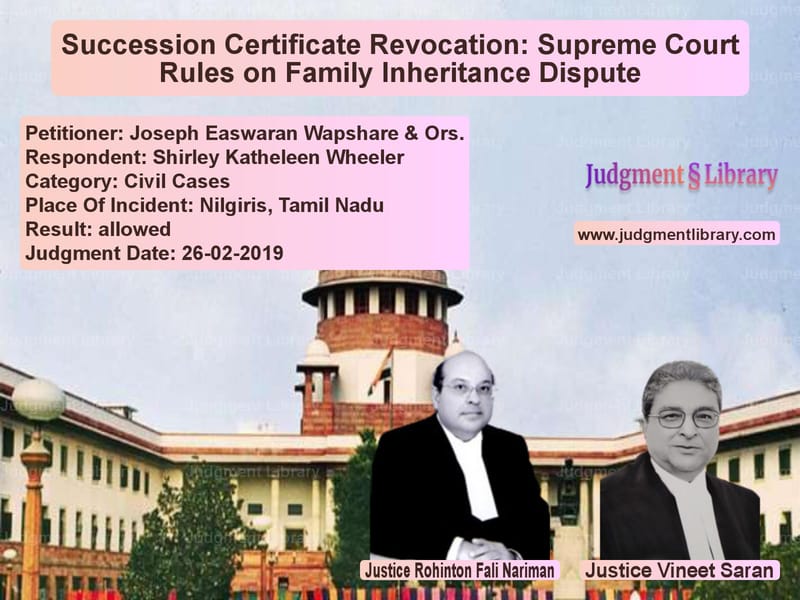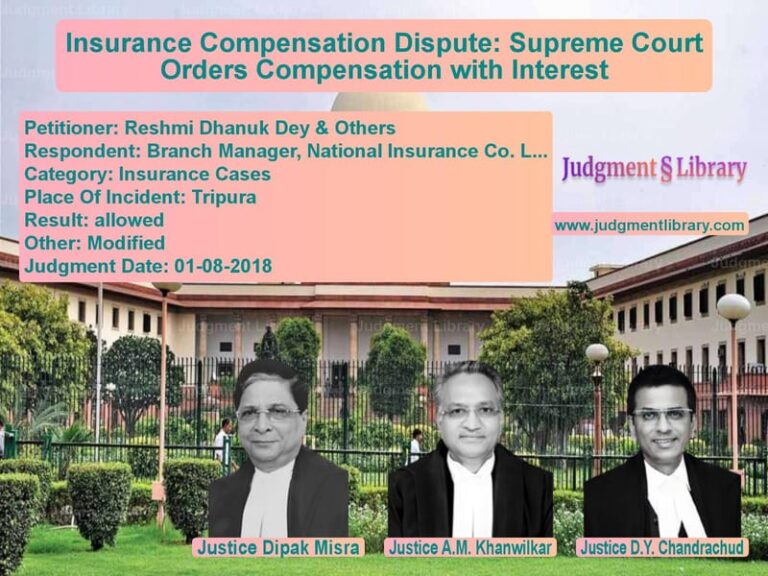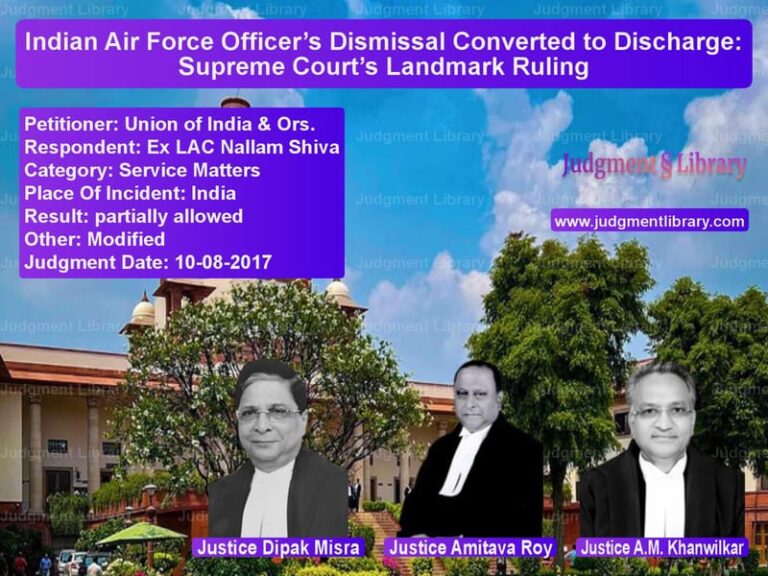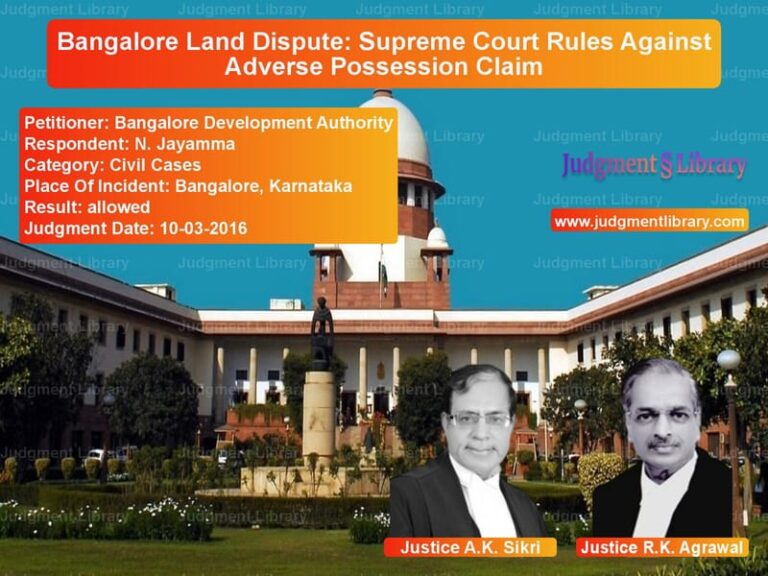Succession Certificate Revocation: Supreme Court Rules on Family Inheritance Dispute
The Supreme Court of India recently adjudicated on a significant inheritance dispute in Joseph Easwaran Wapshare & Ors. vs. Shirley Katheleen Wheeler. The case revolved around the revocation of a succession certificate granted in favor of the appellant, Joseph Easwaran Wapshare, concerning the estate of his late father, Gorden Wapshare. The respondent, Shirley Katheleen Wheeler, challenged the certificate, claiming inheritance rights. This judgment provides clarity on the legal principles governing succession certificates and the rights of heirs under the Indian Succession Act, 1925.
Background of the Case
The dispute originated when Joseph Easwaran Wapshare obtained a succession certificate on 16.03.2005 under Section 372 of the Indian Succession Act. The respondent, Shirley Katheleen Wheeler, sought to revoke the certificate by filing an application under Section 383 of the Act. She claimed to be a legal heir of the deceased and argued that the certificate was improperly granted.
Joseph Easwaran Wapshare, the appellant, contended that the respondent had no legitimate claim to the estate. He asserted that Shirley Katheleen Wheeler was not a direct descendant of the Wapshare family and, therefore, had no legal standing to challenge the certificate.
Key Issues Before the Supreme Court
- Whether the respondent had a legal claim to the estate of Gorden Wapshare.
- Whether the conditions for revocation of a succession certificate under Section 383 of the Indian Succession Act were met.
- Whether the High Court erred in remanding the case for reconsideration instead of dismissing the respondent’s claim.
Petitioners’ (Joseph Easwaran Wapshare & Ors.) Arguments
- The petitioner argued that the succession certificate was granted after following due process, and there were no grounds for its revocation.
- They contended that the respondent was not a lineal descendant of the deceased and had no standing to claim the estate.
- They relied on Section 33(a) of the Indian Succession Act, which limits inheritance rights to the widow and lineal descendants of the deceased.
- The petitioner pointed out that the respondent’s own application referred to her as the daughter of Beatrice Wapshare, with no mention of Edward Wapshare, thereby undermining her claim.
Respondent’s (Shirley Katheleen Wheeler) Arguments
- The respondent claimed to be an heir of Gorden Wapshare and argued that the petitioner had concealed material facts in obtaining the succession certificate.
- She asserted that her rights as a legal heir were ignored, and she had a legitimate claim to the estate.
- The respondent contended that the High Court rightly set aside the lower court’s ruling and remanded the case for reconsideration.
Supreme Court’s Observations
The Supreme Court examined the legal framework governing succession certificates and revocation under Sections 372 and 383 of the Indian Succession Act.
“The certificate so granted could only be revoked for the reasons set out in Section 383, which include fraud, misrepresentation, or a substantial defect in the proceedings. The present case does not satisfy any of these conditions.”
“The respondent describes herself as the daughter of Beatrice Wapshare, but there is no mention of Edward Wapshare as her father. This omission is significant as it negates any claim to the estate as a lineal descendant.”
Key Findings of the Supreme Court
- The Supreme Court ruled that the respondent had no valid legal claim as she was not a lineal descendant of Gorden Wapshare.
- It held that the conditions for revocation of a succession certificate under Section 383 were not met.
- The Court criticized the High Court for remanding the case for reconsideration when it should have dismissed the respondent’s claim outright.
- It reinstated the order of the lower court, which had upheld the validity of the succession certificate.
Impact of the Judgment
The ruling clarifies the scope of succession certificates and the grounds for their revocation. It establishes that:
- Only direct legal heirs and lineal descendants can challenge a succession certificate.
- Claims based on vague or unsubstantiated relationships do not warrant revocation of a validly issued succession certificate.
- The courts must ensure that succession disputes are resolved based on strict legal principles rather than subjective claims.
Conclusion
The Supreme Court’s judgment in Joseph Easwaran Wapshare & Ors. vs. Shirley Katheleen Wheeler reaffirms the principles of inheritance under the Indian Succession Act. By upholding the legitimacy of the succession certificate granted to the appellant, the Court reinforced the legal framework governing inheritance rights and prevented unwarranted challenges to succession claims. This ruling serves as a crucial precedent in cases concerning revocation of succession certificates and inheritance disputes.
Petitioner Name: Joseph Easwaran Wapshare & Ors..Respondent Name: Shirley Katheleen Wheeler.Judgment By: Justice Rohinton Fali Nariman, Justice Vineet Saran.Place Of Incident: Nilgiris, Tamil Nadu.Judgment Date: 26-02-2019.
Don’t miss out on the full details! Download the complete judgment in PDF format below and gain valuable insights instantly!
Download Judgment: Joseph Easwaran Waps vs Shirley Katheleen Wh Supreme Court of India Judgment Dated 26-02-2019.pdf
Direct Downlaod Judgment: Direct downlaod this Judgment
See all petitions in Succession and Wills
See all petitions in Property Disputes
See all petitions in Contract Disputes
See all petitions in Judgment by Rohinton Fali Nariman
See all petitions in Judgment by Vineet Saran
See all petitions in allowed
See all petitions in supreme court of India judgments February 2019
See all petitions in 2019 judgments
See all posts in Civil Cases Category
See all allowed petitions in Civil Cases Category
See all Dismissed petitions in Civil Cases Category
See all partially allowed petitions in Civil Cases Category







